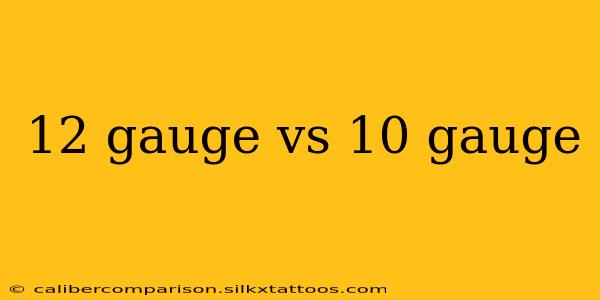Choosing the right shotgun gauge can significantly impact your shooting experience, whether you're a seasoned hunter or a novice at the range. This in-depth comparison of 12 gauge and 10 gauge shotguns will help you understand the key differences and determine which gauge best suits your needs. We'll explore everything from recoil and payload to cost and availability, ensuring you make an informed decision.
Understanding Shotgun Gauges
Before diving into the specifics, it's crucial to understand what "gauge" signifies. The gauge of a shotgun refers to the number of lead balls, each with a diameter equal to the inside diameter of the barrel, that would weigh one pound. Therefore, a lower gauge number (like 10) indicates a larger diameter barrel and a larger shot payload.
12 Gauge: The Workhorse of Shotguns
The 12 gauge is undoubtedly the most popular shotgun gauge globally. Its widespread adoption stems from a compelling combination of factors:
Advantages of 12 Gauge:
- Wide Availability: Ammunition, accessories, and gunsmithing services are readily available for 12 gauge shotguns.
- Versatility: 12 gauge shotguns are available in a vast array of styles, from lightweight sporting models to heavy-duty hunting and tactical versions. This adaptability makes them suitable for diverse applications, including hunting waterfowl, upland birds, deer, and even self-defense.
- Moderate Recoil: While recoil is a factor, it's manageable for most shooters, particularly with modern recoil-reducing technologies.
- Cost-Effective: Generally, 12 gauge ammunition is more affordable than 10 gauge, making it a more economical choice for regular shooting.
Disadvantages of 12 Gauge:
- Recoil: Compared to smaller gauges, the 12 gauge can have noticeable recoil, especially for less experienced shooters or those using heavier loads.
- Weight: While many lighter 12 gauge models exist, they can still be comparatively heavier than some 20-gauge or 28-gauge shotguns.
10 Gauge: The Heavyweight Champion
The 10 gauge is a significantly larger and more powerful shotgun. It's often preferred for specific hunting scenarios where increased stopping power is essential.
Advantages of 10 Gauge:
- Increased Payload: The larger bore delivers a substantially heavier payload of shot, enhancing range and pattern density. This makes it ideal for taking down larger game at longer ranges.
- Greater Knockdown Power: The immense power of the 10 gauge is invaluable for hunting large, tough game animals.
- Superior Performance in Adverse Conditions: The heavier shot charge and larger pattern are advantageous in challenging weather conditions, such as strong winds.
Disadvantages of 10 Gauge:
- Significant Recoil: The recoil from a 10 gauge shotgun is substantial, requiring considerable strength and experience to handle comfortably. It's not a beginner-friendly option.
- Weight and Bulk: 10 gauge shotguns are considerably heavier and bulkier than 12 gauges, making them more cumbersome to carry and maneuver.
- Limited Availability: Ammunition, accessories, and gunsmith services are less readily available compared to 12 gauge.
- Cost: Ammunition is significantly more expensive than 12 gauge.
12 Gauge vs. 10 Gauge: The Verdict
The "best" gauge ultimately depends on your individual needs and shooting experience. The 12 gauge is the versatile and accessible choice, ideal for most hunters and shooters. Its widespread availability, manageable recoil, and cost-effectiveness make it a compelling option.
The 10 gauge, however, reigns supreme when raw power and payload are paramount. If you're hunting extremely large game or require maximum stopping power, a 10 gauge might be warranted. However, its significant recoil and reduced availability make it a specialized choice.
Considerations Beyond Gauge
Remember, several factors beyond gauge influence shotgun performance, including:
- Choke: The choke of the barrel significantly affects shot pattern.
- Ammunition: Choosing the right ammunition type and load is crucial for optimal results.
- Shooter Experience: Your physical strength and shooting proficiency play a vital role in choosing the right gauge.
By carefully weighing the advantages and disadvantages of each gauge and considering these additional factors, you can confidently select the shotgun that perfectly aligns with your shooting style and intended applications.

